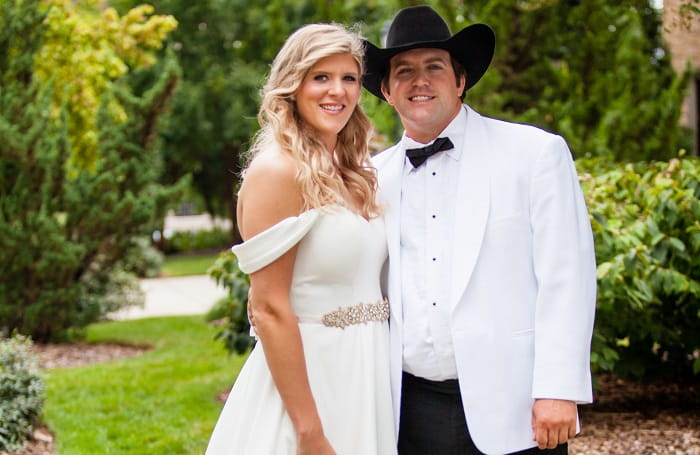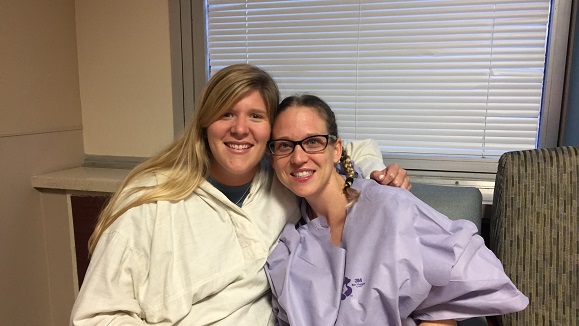By Eleanor “Blitz” Hoppe
I was 18 when I learned that I had the BRCA1 gene mutation through genetic testing. I was offered the testing because several of my distant relatives were diagnosed with breast and ovarian cancer. At the time, I was young and felt invincible. I just put these results in the back of my mind and proceeded with life as usual.
In 2012, my sophomore year of college, my dad was diagnosed with multiple myeloma, an incurable blood cancer. As I began this journey alongside my dad, I fell in love with the nursing profession. Almost immediately, I knew I wanted to change the trajectory of my educational path, and I began looking into accelerated nursing programs. After graduating from Texas Christian University’s nursing program, I moved to Houston to start my nursing career at Houston Methodist.
After a few months of working as a nurse, my previous genetic testing results began to creep back into my mind. I knew it was time for me to start doing my homework. At this point, I was 25 years old and in a long-term relationship with my boyfriend, Austin. We talked about marriage and kids down the road. The ever-increasing possibility of such an aggressive cancer loomed over me like a dark cloud. After all, I know first-hand what it is like to have a parent with cancer.
My parents nicknamed me “Blitz” even before I was born. Truthfully, the name fits me pretty well. In German, it means “fast” or “lightening.” My dad is also an avid football fan, and a “Blitz” is a defensive maneuver to disrupt an offensive pass. It was time for me to create a defensive strategy to disrupt the predictable offensive play, a cancer diagnosis, which life could throw at me whenever it wanted. I made a choice before cancer made it for me.
After months of research, it was evident that a prophylactic double mastectomy would greatly reduce my risk of developing breast cancer — and it would also help me avoid any long-term drug therapies. According to the National Cancer Institute, this procedure can reduce the risk of breast cancer by 95% in women who carry the BRCA1 or BRCA2 genetic mutation. Because of my profession, I was also aware of the incredible surgical and medical advances associated with both mastectomy and reconstructive procedures.
Today, nipple-sparing mastectomies are the norm and, whether you choose implant or non-implant reconstruction, the results are continuing to improve rapidly.
Next, I had to decide who would perform my surgery. That one was easy. I have the privilege of working alongside both Dr. Sherry Lim and Dr. Aldona Spiegel in the operating room; their teamwork and surgical outcomes are truly impressive.
In regard to breast reconstruction, some surgeons can now perform complex and intricate reconstructive surgeries that leave women looking anatomically natural, feminine and beautiful. Ultimately, I identified with Dr. Spiegel’s mission to advance breast restoration procedures in ways that help women enhance their physical and mental vitality.
Before my surgery, I learned that one of my colleagues, Amy, had recently discovered that she had the BRCA2 genetic mutation. We became fast friends as we navigated this process together. It was so comforting to have someone so similar in age to talk to because we shared many of the same emotions and fears surrounding these genetic mutations.
When you’re young, the thought of undergoing a surgery that permanently changes your body can be scary. I still wondered if I would look the same — if I would still look like me. Amy and I grew incredibly close. In fact, I requested that she be my certified registered nurse anesthetist (CRNA) for my own surgery because there is no one I trust more to breathe for me while I am asleep. When it was her turn for surgery, I was by her side to meet her at the finish line. Today, both of our surgeries are behind us and our futures no longer include the high probability of cancer.
Amy and I want women, especially young women, to know that knowledge is power. Don’t be afraid to get genetic testing, and certainly don’t be afraid to take control of your health.
This type of surgery is not what it was five to 10 years ago. This surgery is not as scary as it may seem on the surface. Today, new surgical techniques and advanced technology have completely changed a surgery that women previously avoided. You no longer have to live with the fear of getting this cancer. You have options, you have hope and you are not alone.
Without the fear of cancer, our futures are bright. Amy is now newly engaged to a wonderful man, Chris. I look forward to being by her side for her big day — and for many days in the future.



